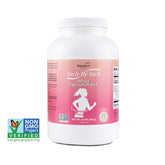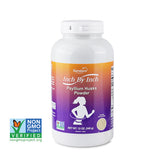This Powder Helps Relieve Constipation—But You Must Take It with Water

Psyllium husk is known for improving constipation and regulating cholesterol, but it also supports blood sugar control and weight management. However, it must be taken with plenty of water, as overconsumption without adequate hydration can lead to side effects.
Many people struggling with constipation turn to psyllium husk powder for relief. Psyllium husk is the outer shell of the seed from the Plantago ovata plant, often called “cheonzancho” in Korean. Traditionally used in India and China to treat constipation, diarrhea, hemorrhoids, bladder issues, and high blood pressure, it has also been used in Europe to manage cholesterol and blood sugar levels. Let’s take a closer look at the benefits, potential side effects, and precautions when consuming psyllium husk.
Rich in Dietary Fiber—Good for More Than Just Digestion
More than 80% of psyllium husk is dietary fiber, containing both soluble and insoluble types. Soluble fiber absorbs waste in the intestines and increases stool viscosity, helping it move more easily. Insoluble fiber absorbs water, increases stool bulk, and shortens the time it takes for waste to pass through the colon—effectively relieving constipation. According to the Korea Food and Drug Administration (MFDS), psyllium husk is particularly rich in hemicellulose, an insoluble fiber that stimulates bowel movements.
Here are four major health benefits of psyllium husk:
1. Improved Bowel Movements
The soluble fiber in psyllium acts as a prebiotic, feeding beneficial gut bacteria and promoting healthy bowel activity. Insoluble fiber increases stool bulk and stimulates the intestines. A study by the University of Nebraska Medical Center found that in 22 patients with constipation, taking psyllium husk for 8 weeks significantly improved stool frequency, weight, and consistency. According to the MFDS, at least 5g of psyllium husk per day is needed to help with regular bowel movements.
2. Lower Blood Cholesterol
Psyllium husk also helps regulate cholesterol levels. Noh Yoon-jung, a pharmacist and head of Consumer Health at Hubase, explains that soluble fiber in psyllium prevents bile acid from being reabsorbed, prompting the body to use more cholesterol to produce bile. This helps lower LDL ("bad") cholesterol. In a study by the University of Toronto involving 28 adults, LDL levels significantly dropped after taking psyllium for more than 3 weeks. The MFDS recommends at least 6g of psyllium husk per day to see cholesterol-lowering effects.
3. Blood Sugar Control
Psyllium also helps manage blood sugar, making it useful for diabetes prevention. Soluble fiber forms a gel-like substance when mixed with water, which slows digestion and helps prevent spikes in blood sugar levels. This slower digestion reduces insulin secretion and may help prevent insulin resistance. It can also support better circulation and help prevent hypertension and arterial diseases.
4. Weight Management and Satiety
Taking psyllium husk along with exercise may support weight loss efforts. Like fiber-rich vegetables and fruits, it increases satiety and helps prevent overeating. “Psyllium doesn’t lead to immediate weight loss,” explains Noh Yoon-jung, “but can help as part of a long-term diet high in fiber.” When combined with water, psyllium expands and increases the feeling of fullness, which helps reduce calorie intake.
Be Careful—Overuse May Cause Bloating, and Water Intake Is Essential
There are two main side effects of psyllium husk: allergic reactions and digestive discomfort. Individuals allergic to psyllium may experience symptoms like rashes, redness, or itching and should discontinue use immediately. The recommended intake is between 5g and 10g per day. Consuming more than that can slow digestion, causing bloating and excessive gas—but these symptoms usually subside by reducing the dose.
Because it’s a fiber supplement, psyllium may slightly interfere with mineral absorption, though this is not considered clinically significant.
The most important precaution is ensuring adequate hydration. Without enough water, the fiber can harden in the intestines and actually worsen constipation. For the best results, it’s recommended to drink at least 1.5 liters of water daily. Noh Yoon-jung emphasizes, “Make sure to drink a full glass of water when taking psyllium, and try to increase your overall daily water intake to see real benefits.”
Source: 헬스조선(https://m.health.chosun.com/)
Shop Psyllium Husk Products
![Inch By Inch (Psyllium Husks Powder) [Buy 4 Get 1 FREE] - Health Korea Shop](http://healthkoreashop.com/cdn/shop/files/health-korea-shop-default-title-inch-by-inch-psyllium-husks-powder-buy-4-get-1-free-26476880429165_165x.gif?v=1757024963)
![Inch By Inch (Psyllium Husks Powder) [Buy 4 Get 1 FREE] - Health Korea Shop](http://healthkoreashop.com/cdn/shop/files/health-korea-shop-default-title-inch-by-inch-psyllium-husks-powder-buy-4-get-1-free-26471389102189_165x.jpg?v=1757024971)
![Inch By Inch (Whole Psyllium Husks) [Buy 3 Get 1 FREE] - Health Korea Shop](http://healthkoreashop.com/cdn/shop/files/health-korea-shop-default-title-inch-by-inch-whole-psyllium-husks-buy-3-get-1-free-26471348764781_165x.jpg?v=1757024989)

![Inch By Inch (Organic Psyllium Husks Powder) [Buy 3 Get 1 FREE] - Health Korea Shop](http://healthkoreashop.com/cdn/shop/files/health-korea-shop-default-title-inch-by-inch-organic-psyllium-husks-powder-buy-3-get-1-free-26471394771053_165x.jpg?v=1757024965)
![Inch By Inch (Organic Psyllium Husks Powder) [Buy 3 Get 1 FREE] - Health Korea Shop](http://healthkoreashop.com/cdn/shop/files/health-korea-shop-default-title-inch-by-inch-organic-psyllium-husks-powder-buy-3-get-1-free-26471394803821_165x.png?v=1757025003)

